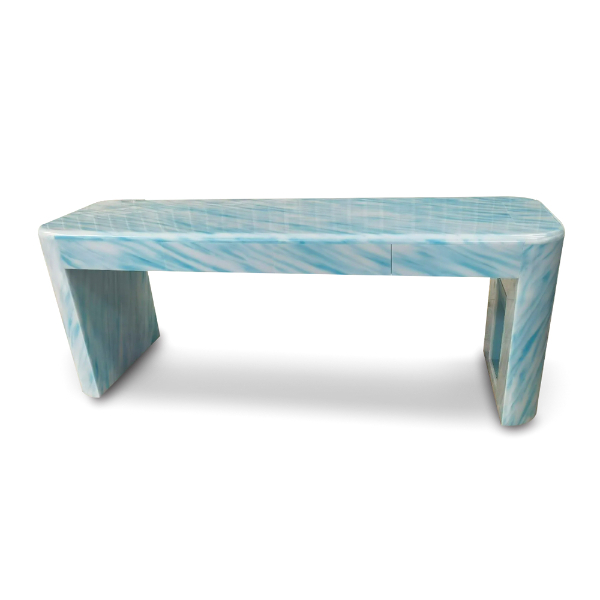
Artificial Marble countertops are a popular choice in both residential and commercial spaces due to their aesthetic appeal, durability, and affordability. Made from a blend of natural marble dust and synthetic resins, these countertops offer a versatile and practical alternative to natural marble.

What are Artificial Marble Countertops?
Artificial Marble Countertops are engineered surfaces made by combining marble dust with resins, such as polyester or acrylic, to form a solid, homogeneous material. The resulting product resembles natural marble in appearance but offers improved durability and lower maintenance requirements. These countertops are available in various colors, patterns, and finishes, allowing for a high degree of customization to match different interior designs.
Benefits of Artificial Marble Countertops
1.Cost-Effectiveness:Artificial marble countertops are generally more affordable than natural marble, making them a budget-friendly option for high-quality surfaces.
2.Durability:The combination of marble dust and resins creates a material that is resistant to scratches, stains, and impacts. This durability makes it suitable for high-traffic areas and heavy use.
3.Low Maintenance:Unlike natural marble, artificial marble countertops do not require sealing. Their non-porous surface makes them resistant to stains and easy to clean with regular mild soap and water.
4.Seamless Appearance:Artificial marble can be fabricated to create a seamless look with minimal visible joints, enhancing the aesthetic appeal and making it easier to clean.
5.Design Flexibility:Available in a wide range of colors and patterns, artificial marble countertops can be customized to suit various design preferences, from classic to contemporary styles.
6.Repairability:Minor scratches and blemishes on artificial marble can often be repaired with polishing or resurfacing, restoring the surface to its original condition.
Manufacturing Process
1.Material Preparation:The base materials, including marble dust and resins, are mixed together with pigments to achieve the desired color and pattern.
2.Casting:The mixture is poured into molds to form countertop slabs of various sizes and thicknesses. The casting process ensures uniformity in texture and appearance.
3.Curing:The cast slabs are cured to harden the material. This process involves heating or allowing the slabs to set until they achieve the desired hardness and durability.
4.Finishing:After curing, the countertops are polished to a smooth, glossy finish. Additional finishing processes may include sanding and coating to enhance durability and aesthetics.
Applications
1.Kitchen Countertops:Artificial marble is a popular choice for kitchen countertops due to its durability and ease of maintenance. It provides a sleek and stylish surface that can withstand daily use.
2.Bathroom Vanities:In bathrooms, artificial marble countertops offer a water-resistant surface that is both practical and visually appealing for vanities and sinks.
3.Commercial Spaces:Artificial marble countertops are used in commercial settings, such as offices, hotels, and restaurants, where durability and ease of cleaning are essential.
4.Work Surfaces:They are also suitable for work surfaces in laboratories, workshops, and other environments where a resilient and low-maintenance surface is needed.
Maintenance and Care
1.Cleaning:Clean artificial marble countertops with a mild soap or detergent and warm water. Use a soft cloth or sponge to avoid scratching the surface. Regular cleaning helps maintain the countertop's appearance and prevents buildup.
2.Avoiding Damage:While artificial marble is durable, avoid placing hot pots or pans directly on the surface to prevent potential damage. Use trivets or heat pads to protect the countertop.
3.Repairing:Minor scratches can be polished out using a suitable polish or repair kit. For more significant damage, consult a professional for repair options.
4.Stain Removal:Most stains can be removed with a mild abrasive cleaner or a mixture of baking soda and water. For stubborn stains, seek advice from the manufacturer or a professional.
Key Considerations
1.Quality:The quality of artificial marble can vary between manufacturers. Consider factors such as density, finish, and warranty when selecting a countertop.
2.Installation:Proper installation is crucial to ensure the longevity and performance of artificial marble countertops. It is recommended to hire a professional installer with experience in handling this material.
3.Customization:Take advantage of the customization options available for artificial marble countertops to achieve a look that fits your design preferences and functional needs.
Artificial marble countertops offer a practical and stylish alternative to natural marble, combining aesthetic appeal with durability and ease of maintenance. Their cost-effectiveness, design flexibility, and seamless appearance make them a popular choice for a variety of applications. By understanding their benefits, maintenance requirements, and key considerations, you can make an informed decision about incorporating artificial marble countertops into your space.